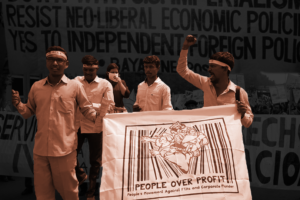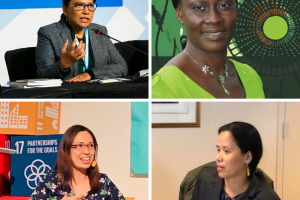IBON International Update #3
World Bank – October 12, 2013
Washington, D.C., October 11—Corporate Accountability International (CAI) and IBON International joined forces in Washington, D.C. this week to challenge the World Bank Group on its role in privatized water utilities.
CAI is a membership organization with a 35-year track record on protecting human rights, public health and the environment from corporate greed and abuse around the world. It is currently pursuing a campaign to challenge corporate control of water.
IBON on the other hand has consistently opposed water privatization since the 1990s and is the secretariat of the regional Water for the People Network (WPN) with members in the Philippines, Sri Lanka, Nepal, Mongolia, Bangladesh, and Vietnam. WPN challenges water-related policies, structures and institutions that compromise the people’s right to water. The network also proactively seeks community-based, pro-people solutions to such problems.
Shayda Edwards Naficy, CAI’s international water campaign director, and Jennifer del Rosario-Malonzo, IBON’s development finance program manager, met with the International Finance Corporation (IFC) Head of Water and Municipal Infrastructure; the WB Executive Director (ED) for the Philippines; and a number of WB ED Advisors to discuss concerns on privatized water utilities such as in the case of Metro Manila.
Naficy and Malonzo highlighted problems including incessant water tariff hikes that impact the poor’s access and right to water, broken promises of universal coverage and better quality of service, and issues of accountability and corporate abusive practices.
Meeting the IFC
The water advocates met with three representatives of the IFC, WB’s private sector arm, including the Global Head of Water and Municipal Infrastructure, Elena Bourganskaia; a water industry expert with years of experience working in the private sector; and a communications officer.
In this unique opportunity, a member of the Philippine movement against water privatization faced representatives of the IFC—the primary institution responsible for the privatization. Malonzo directly confronted the IFC regarding Manila Water and the Bank’s promotion of private water. While it was a civil clash of opposing views, some interesting information and opportunities for further engagement emerged that can strengthen the campaign moving forward.
The IFC officials emphasized that the finance institution mainly considers sustainability of investments or, in other words, ensuring cost recovery. Malonzo and Naficy meanwhile argued that such emphasis on cost recovery has meant unaffordable water services that impact access of poor communities, an issue that should be taken into account by the IFC as part of the WB that is supposedly about development.
IFC’s involvement also assumes a conflict of interest as it has been the Philippine government’s adviser on water privatization, while holding equity shares in Manila Water. The push for privatization of the Metropolitan Waterworks and Sewerage System (MWSS) in 1997 came from the agency’s massive debts incurred from the WB and other international financial institutions. IFC became the government’s consultant in the privatization project and it designed the Concession Agreement that the MWSS signed with Maynilad and Manila Water, the two private water concessionaires serving the country’s national capital region.
WPN has long been calling on the Philippine government to cancel the Concession Agreement, which was designed to regularly adjust tariffs to ensure the two privatize firms’ financial viability.
Besides periodic rate rebasing, the basic charge is also adjusted annually for inflation and quarterly for foreign currency fluctuations. There is also a separate fixed PhP 1.00 currency-related charge. The private concessionaires are also allowed to collect additional fees resulting from so-called extraordinary price adjustment as well as collect an environmental charge. Recently, Philippine members of WPN exposed that even corporate taxes are passed on to consumers, which has prompted a senator last August to call for a Senate inquiry.
Audience with the EDs
Meanwhile, Philippine ED Roberto Tan, who also represents Brazil, Colombia, Dominican Republic, Ecuador, Haiti, Panama, Suriname, and Trinidad & Tobago, promised to relay concerns about Manila Water to the IFC, which has a 6-percent share in the company. He was particularly keen to ask the IFC on its stance regarding Manila Water’s intent to take the Philippine government to arbitration for refusing to raise consumer rates.
The MWSS Regulatory Office finally bowed to public outcry on affordability and decided to roll back rates this September. The regulator denied the petition to raise tariffs and instead approved a downward adjustment, which should be effective starting October but the concessionaires sought arbitration, freezing water rates until a final decision is reached by an international arbitration panel. Manila Water filed a dispute notice before the International Chamber of Commerce on September 24, while Maynilad did the same on October 4.
Naficy and Malonzo also met with an advisor to the United States ED—the most powerful ED at the Bank. The advisor appreciated the briefing on the WB’s water practices and Manila Water, and expressed concerned about the impact these practices have on the lowest income households, stating that she may take the issue up with the IFC. Another advisor who shares many of the advocates’ apprehensions informed them that several other EDs have internally expressed concern.
Before a crowd of over 100 people, Malonzo asked a panel of more than 10 EDs what will it take for the WB to divest from private water. The session was part of the events on the sidelines of the 2013 IMF-WB Annual Meetings. Germany, Switzerland, the U.S., France, and Saudi Arabia were among the Directors that listened attentively as Malonzo asked, “What would it take for Executive Directors to support the call for the World Bank to stop promoting the privatization of water utilities, given that it’s not working from the development perspective nor in terms of promoting the human right to water?”
The French ED, who responded to the question, defended water privatization as appropriate in some cases, depending on the context. This is not surprising as France is home to one of the world’s largest water transnational corporations, Suez.
Nevertheless, Naficy said this kind of intervention helps get the message across broader audience within the WB and increase pressure for change. Since 2012, CAI has been calling for the WB to disinvest from private water and stop promoting privatization of water services across the globe.
The advocates also met with advisors of US representatives on Capitol Hill, and with reporters from Thomson Reuters and Financial Times.
Return to public
IBON and CAI are united in the call for public control over water utilities because it is the only mechanism fully consistent with the right to water. As the CAI’s report Shutting the Spigot on Private Water: The case for the World Bank to divest stated: “Public investment in infrastructure has proven time and again to be the only viable means of delivering broad and equitable access to water.”
Water advocacy groups like WPN assert that having well-meaning regulators monitoring the water firms is not enough. Protecting the interest of consumers and the human right to water particularly of the poor and marginalized can only be realized through effective state control. ###



